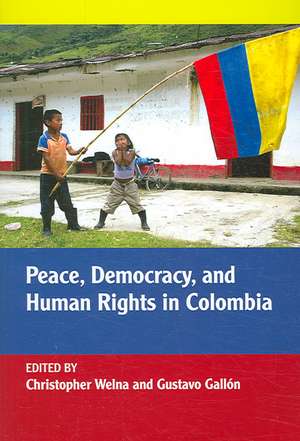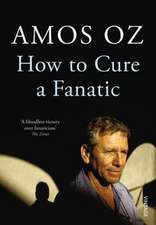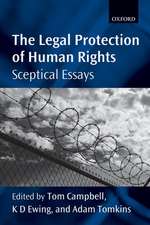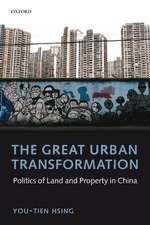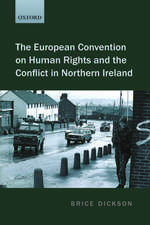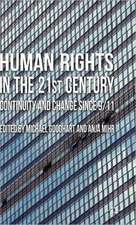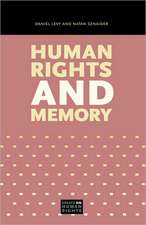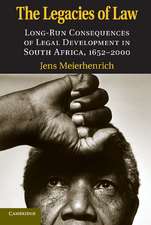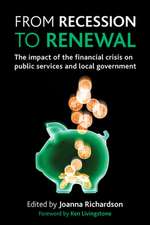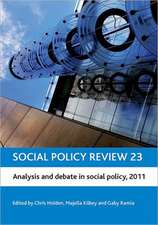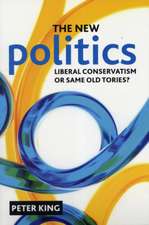Peace, Democracy, and Human Rights in Colombia: Kellogg Institute Series on Democracy and Development
Autor Christopher Welna, Gustavo Gallonen Limba Engleză Paperback – 14 ian 2007
Din seria Kellogg Institute Series on Democracy and Development
-
 Preț: 222.01 lei
Preț: 222.01 lei - 19%
 Preț: 450.29 lei
Preț: 450.29 lei -
 Preț: 365.21 lei
Preț: 365.21 lei -
 Preț: 277.23 lei
Preț: 277.23 lei -
 Preț: 277.53 lei
Preț: 277.53 lei -
 Preț: 173.49 lei
Preț: 173.49 lei -
 Preț: 299.65 lei
Preț: 299.65 lei -
 Preț: 243.30 lei
Preț: 243.30 lei -
 Preț: 279.23 lei
Preț: 279.23 lei - 27%
 Preț: 701.59 lei
Preț: 701.59 lei -
 Preț: 162.65 lei
Preț: 162.65 lei -
 Preț: 221.38 lei
Preț: 221.38 lei -
 Preț: 216.16 lei
Preț: 216.16 lei -
 Preț: 180.06 lei
Preț: 180.06 lei -
 Preț: 157.58 lei
Preț: 157.58 lei -
 Preț: 232.16 lei
Preț: 232.16 lei - 15%
 Preț: 456.46 lei
Preț: 456.46 lei - 23%
 Preț: 591.49 lei
Preț: 591.49 lei -
 Preț: 276.55 lei
Preț: 276.55 lei - 23%
 Preț: 588.22 lei
Preț: 588.22 lei -
 Preț: 199.49 lei
Preț: 199.49 lei - 27%
 Preț: 699.35 lei
Preț: 699.35 lei -
 Preț: 280.96 lei
Preț: 280.96 lei -
 Preț: 367.12 lei
Preț: 367.12 lei - 27%
 Preț: 697.53 lei
Preț: 697.53 lei -
 Preț: 205.64 lei
Preț: 205.64 lei -
 Preț: 464.59 lei
Preț: 464.59 lei -
 Preț: 443.72 lei
Preț: 443.72 lei -
 Preț: 243.30 lei
Preț: 243.30 lei -
 Preț: 254.37 lei
Preț: 254.37 lei -
 Preț: 324.83 lei
Preț: 324.83 lei -
 Preț: 354.99 lei
Preț: 354.99 lei -
 Preț: 200.26 lei
Preț: 200.26 lei -
 Preț: 325.43 lei
Preț: 325.43 lei -
 Preț: 177.57 lei
Preț: 177.57 lei -
 Preț: 173.91 lei
Preț: 173.91 lei -
 Preț: 275.43 lei
Preț: 275.43 lei -
 Preț: 300.58 lei
Preț: 300.58 lei -
 Preț: 252.64 lei
Preț: 252.64 lei -
 Preț: 275.40 lei
Preț: 275.40 lei -
 Preț: 244.94 lei
Preț: 244.94 lei -
 Preț: 298.67 lei
Preț: 298.67 lei -
 Preț: 156.23 lei
Preț: 156.23 lei
Preț: 284.82 lei
Nou
Puncte Express: 427
Preț estimativ în valută:
54.50€ • 57.02$ • 45.27£
54.50€ • 57.02$ • 45.27£
Carte tipărită la comandă
Livrare economică 03-17 aprilie
Preluare comenzi: 021 569.72.76
Specificații
ISBN-13: 9780268044091
ISBN-10: 0268044090
Pagini: 470
Dimensiuni: 159 x 228 x 27 mm
Greutate: 0.63 kg
Ediția:1st Edition
Editura: MR – University of Notre Dame Press
Seria Kellogg Institute Series on Democracy and Development
ISBN-10: 0268044090
Pagini: 470
Dimensiuni: 159 x 228 x 27 mm
Greutate: 0.63 kg
Ediția:1st Edition
Editura: MR – University of Notre Dame Press
Seria Kellogg Institute Series on Democracy and Development
Recenzii
“Organized around the three themes in the title – the interlinked issues of peace, democracy and human rights – the volume explores such key topics of relevance to Colombian politics as the drug trade, the peace process, institutional reform and the effects of U.S. foreign policy… There continues to be a shortage of solid political science work of the topic of Colombia, despite its complexity and centrality to U.S. foreign policy, and this volume helps fill that gap. The presentation is such that the book can be is useful and accessible to academics, policymakers and the general public.” — The Americas, 64, 4, April 2008
“This collection of papers asks why Colombia’s peace efforts have failed to produce durable peace. Why has Colombia’s long-standing democracy experienced such glaring failures? Who should be accountable for the violence suffered by the Colombian people? This book tries to answer these questions, and delves deeply into the underlying politics and human rights issues in Colombia.” — Abstracts of Public Administration, Development, and Environment
“The contributors to the book write on essential themes, such as institutional (especially electoral) reform, the politics of the narcotics trade, shifts and continuities in the US policy, and human rights. . . . The volume puts a particular stress on Plan Colombia. Its contributors argue convincingly that the rhetoric of an integrated approach to Colombian narco-violence was not acted upon. Resources were heavily concentrated in a counter-narcotics campaign that stressed the defeat of terrorism and undercutting the resource base of the guerrillas, together with the interdiction and penalisation of drugs, traffic, crop fumigation, and eradication.” —Bulletin of Latin American Research, Vol. 29, No. 1, 2009
Notă biografică
CHRISTOPHER WELNA, a political scientist and former executive director of the Helen Kellogg Institute for International Studies at the University of Notre Dame, is president of the Associated Colleges of the Midwest.
GUSTAVO GALLÓN is the director of the Colombia Commission of Jurists.
CONTRIBUTORS: Christopher Welna, Herbert Tico Braun, Álvaro Camacho Guizado, Andrés López Restrepo, Daniel García-Peña Jaramillo, Cynthia J. Arnson, Eduardo Pizarro, Ana María Bejarano, Matthew Søberg Shugart, Erika Moreno, Luis Eduardo Fajardo, Francisco Gutiérrez Sanín, Arlene B. Tickner, Gustavo Gallón.
Descriere
“Christopher Welna and Gustavo Gallón have assembled a first-rate group of authors to produce an unusually comprehensive analysis of Colombia's profound and complex problems. The chapters are cogently argued, packed with keen insight, and often buttressed by rich empirical data. They cover the gamut—from culture to drugs to political economy, institutional reform, and U.S. policy. It is impossible to come away from reading this superb volume without understanding that, whatever progress has been made in Colombia in recent years, the task of constructing an enduring peace and just society remains a formidable one.” —Michael Shifter, Vice President for Policy, Inter-American Dialogue
"This excellent volume provides not only an introduction to the difficult issues of peace, democracy, and human rights in Colombia; it also offers a series of very intelligent and provocative discussions of these issues. The authors make use of a wide variety of primary and secondary sources that will be of interest to scholars, policymakers, and the growing number of general readers interested in the direction of U.S. foreign policy." —John C. Dugas, Kalamazoo College
“Welna and Gallón have admirably met the challenge put to them by the Rev.Theodore M. Hesburgh, who asked, ‘What can a university in the United States do to help resolve Colombia's conflict?’ Bringing together clear-eyed analyses by the foremost Colombian and American scholars, they shed much-needed light on the root causes of the longest-running guerrilla war in this hemisphere. They provide a critical path to understanding Colombia's core political challenges, and in so doing they lay the groundwork for an eventual resolution to Latin America's costliest struggle for democracy.” —Anthony DePalma, New York Times
Colombia is home to the longest-running guerilla war in this hemisphere, a war that has evolved into a multisided conflict. Over forty years ago guerrilla leaders launched their campaign to overthrow the government in the wave of Latin American revolutionary movements. While such movements in other countries from that era have negotiated settlements or suffered defeat, in Colombia two major guerrilla groups soldier on, at times in competition with each other. In the intervening years, these groups have been joined by new antagonists who sometimes strike alliances, though rivalry generally prevails. Drug traffickers, right-wing paramilitary squads, government police units, Colombia's armed forces, and U.S. advisors, among others, have all joined the fray.
For scholars, this timely collection provides a theoretical understanding of human rights violations, corruption, political fragmentation, and reform. Policy makers will find careful analyses and debate about policy outcomes and alternatives, as well as recommendations for action to protect rights, strengthen democracy, and pursue peace. Students will find a route to understanding the history and dynamics of Colombia's contemporary challenges of human rights, democracy, and peace.
